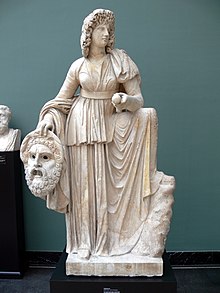Melpomene


In Greek mythology, Melpomene (/mɛlˈpɒmɪniː/; Ancient Greek: Μελπομένη, romanized: Melpoménē, lit. 'to sing' or 'the one that is melodious'), initially the muse of chorus, eventually became the muse of tragedy, and is now best known in that association.[1]
Etymology[]
Melpomene's name was derived from the Greek verb melpô or melpomai meaning "to celebrate with dance and song."
Appearance[]
Melpomene is often represented with a tragic mask and wearing the cothurnus, boots traditionally worn by tragic actors. Often, she also holds a knife or club in one hand and the tragic mask in the other.
Family[]
Melpomene is the daughter of Zeus and Mnemosyne.[2][3][4] Her sisters include Calliope (muse of epic poetry), Clio (muse of history), Euterpe (muse of lyrical poetry), Terpsichore (muse of dancing), Erato (muse of erotic poetry), Thalia (muse of comedy), Polyhymnia (muse of hymns), and Urania (muse of astronomy).
She is also the mother of several of the Sirens,[5][6][7] the divine handmaidens of Kore (Persephone/Proserpina) who were cursed by her mother, Demeter/Ceres, when they were unable to prevent the kidnapping of Kore (Persephone/Proserpina) by Hades/Pluto.
Mythology[]
In Greek and Latin poetry since Horace (d. 8 BC), it was commonly auspicious to invoke Melpomene.[8]
See also[]
Notes[]
- ^ Blyth, Charles (1990), Virgilian Tragedy and Troilus, 24, The Chaucer Review, pp. 211–218
- ^ Hesiod, Theogony 77
- ^ Diodorus Siculus, Bibliotheca historica 4.7.1
- ^ Pseudo-Apollodorus, Bibliotheca 1.3.1
- ^ Pseudo-Apollodorus, Bibliotheca 1.3.4 & Epitome 7.18
- ^ Hyginus, Fabulae Preface, 125 & 141, ed. Grant
- ^ Tzetzes, Chiliades, 1.14, line 339
- ^ Bruce Merry, Encyclopedia of Modern Greek Literature (Santa Barbara CA: Greenwood Publishing Group, 2004), 269-70. ISBN 0313308136
References[]
- Diodorus Siculus, The Library of History translated by Charles Henry Oldfather. Twelve volumes. Loeb Classical Library. Cambridge, Massachusetts: Harvard University Press; London: William Heinemann, Ltd. 1989. Vol. 3. Books 4.59–8. Online version at Bill Thayer's Web Site
- Diodorus Siculus, Bibliotheca Historica. Vol 1-2. Immanel Bekker. Ludwig Dindorf. Friedrich Vogel. in aedibus B. G. Teubneri. Leipzig. 1888-1890. Greek text available at the Perseus Digital Library.
- Gaius Julius Hyginus, Fabulae from The Myths of Hyginus translated and edited by Mary Grant. University of Kansas Publications in Humanistic Studies. Online version at the Topos Text Project.
- Hesiod, Theogony from The Homeric Hymns and Homerica with an English Translation by Hugh G. Evelyn-White, Cambridge, MA.,Harvard University Press; London, William Heinemann Ltd. 1914. Online version at the Perseus Digital Library. Greek text available from the same website.
- John Tzetzes, Book of Histories, Book I translated by Ana Untila from the original Greek of T. Kiessling's edition of 1826. Online version at theio.com
- Pseudo-Apollodorus, The Library with an English Translation by Sir James George Frazer, F.B.A., F.R.S. in 2 Volumes, Cambridge, MA, Harvard University Press; London, William Heinemann Ltd. 1921. ISBN 0-674-99135-4. Online version at the Perseus Digital Library. Greek text available from the same website.
External links[]
 Media related to Melpomene at Wikimedia Commons
Media related to Melpomene at Wikimedia Commons- Primary sources and basic information concerning Melpomene
- Warburg Institute Iconographic Database (ca 50 images of Melpomene)
- Greek Muses
- Children of Zeus
- Ancient Greek theatre
- Music in Greek mythology